
AAVMC’s Inaugural Virtual Conference Real Success in Every Respect
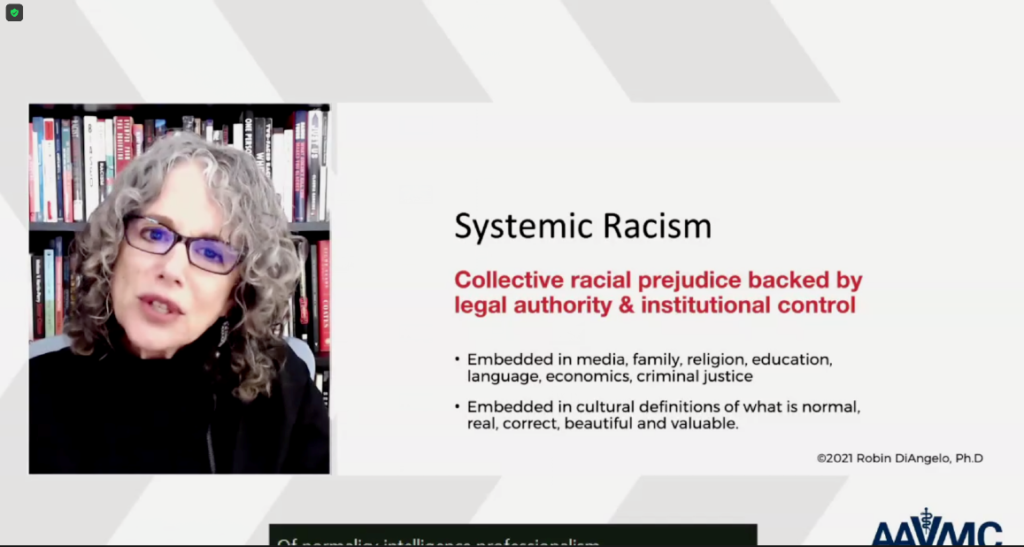
A record 365 attendees tuned into the AAVMC’s first virtual conference, “Catalyze 2021: Connect and Innovate in the Face of Global Challenges,” March 3-5. 2021. Conference officials noted registrants representing 37 U.S. schools, 20 international schools (including 14 from the University of Seoul in South Korea) and about a dozen corporations and associations.
The AAVMC managed to present last year’s conference just days before the pandemic jolted the world “fast-forward” into digital interaction. This year’s virtual conference was presented seamlessly through a specially created conference website integrating Zoom sessions and breakout rooms with a content-rich platform, a virtual photo booth, live question-and-answer sessions, and interactive social media chats.
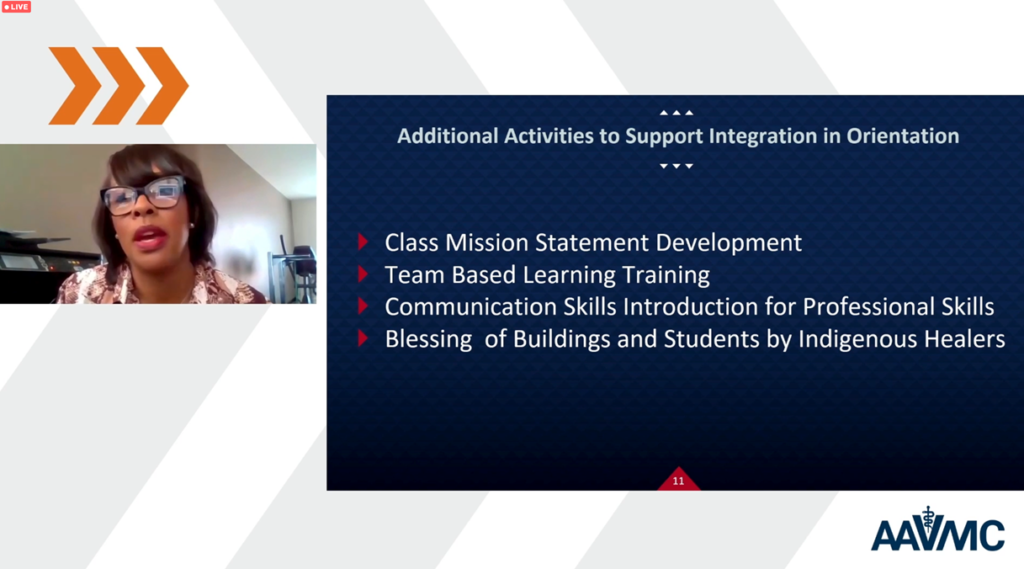
More than 20 online sessions spread over three days covered diverse topics such as “Innovative Veterinary Admissions Practices to Enhance Diversity,” “How Strategic Communications Can Increase Your Reach,” “How Debt is Changing the Face of the Profession,” and “Building a Pipeline of Leaders for Academic Veterinary Medicine.”
In plenary sessions, three keynote speakers covered socially relevant topics—systemic racism (Dr. Robin DiAngelo), ableism (Dr. Jay Dolmage), and how to ask probing, transformative questions to spark creativity and create dynamic change (Dr. Hal Gregersen).
How the Pandemic Changed Teaching
Numerous sessions focused on how schools and colleges of veterinary medicine responded to the pandemic, such as “Global Lessons in Shifting to Online Veterinary Education,” and “The Impact of the COVID-19 Pandemic on Assessment Strategies in Health Professions Education: Lessons Learned About Assessment During the Lockdown.” In a session on “Responses to a Pandemic: In the Trenches of Rapid Curricular Change,” speakers presented survey results showing that, despite negative pandemic pressures, even in a post-pandemic world, faculty plan to maintain some elements of pandemic-altered, online education, such as online lectures. Among the survey comments: “This emergency put teaching back as my primary focus.”
A session on the AAVMC’s Competency-based Veterinary Medical Education (CBVE) illustrated how an emphasis on competency versus traditional measures such as grades helped some faculty transition to new educational models during the pandemic.
Learn more about CBVE in this video, shown during the conference.
A Wellbeing Emphasis
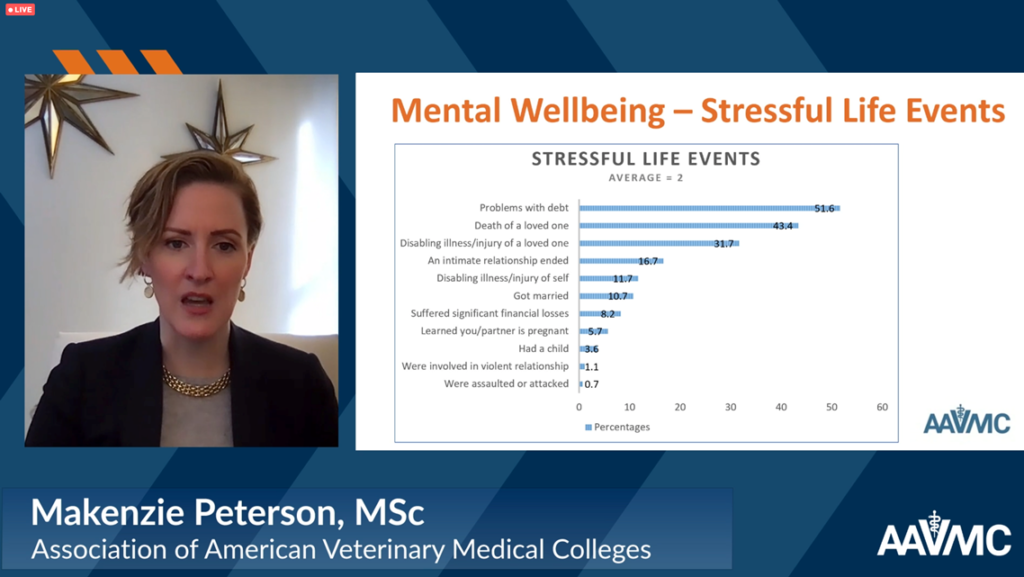
Several sessions focused on wellbeing and coping with stress, such as “Anxiety and the Brain: Strategies for Learning, Memory, and Emotional Regulation,” and “The High Cost of Resilience: A Discussion of the Overarching Impacts of Veterinary Student Stress.” In the session on resilience, speaker Dr. Jeremiah Grissett from Oklahoma State University said that veterinary medical school is stressful and the “ordinary magic” of resilience is good, but he warned that an overemphasis on resilience can inadvertently place too much pressure and blame on students. “We need to normalize asking for help,” he said.
The AAVMC’s Director of Wellbeing Ms. Makenzie Peterson updated attendees on the association’s Wellbeing Operations Plan. The AAVMC created Peterson’s position last year to develop and implement programs that promote wellbeing at AAVMC member institutions. Peterson developed monographs on topics such as “Grief, Loss and Death During COVID-19,” that were particularly pertinent during the pandemic. (That monograph and others can be found on the bottom of this page.)
Peterson said that many CVMs are addressing issues at the treatment or screening level but should focus more on prevention. “Yoga and meditation will not save the health professions,” she said, “How do we look at wellbeing across the entire academic lifespan?”
She emphasized the need for an institution-wide approach to wellbeing and plans to roll out a variety of tools to help schools implement wellness measures. She said that a comprehensive approach would include curricula/trainings, emotional and social support and an improved learning environment.
She acknowledged the high-stress environment of veterinary medical school can sometimes be motivational, but “unchecked stress leads to distress.”
Honoring Award Winners Who Exemplify True Success
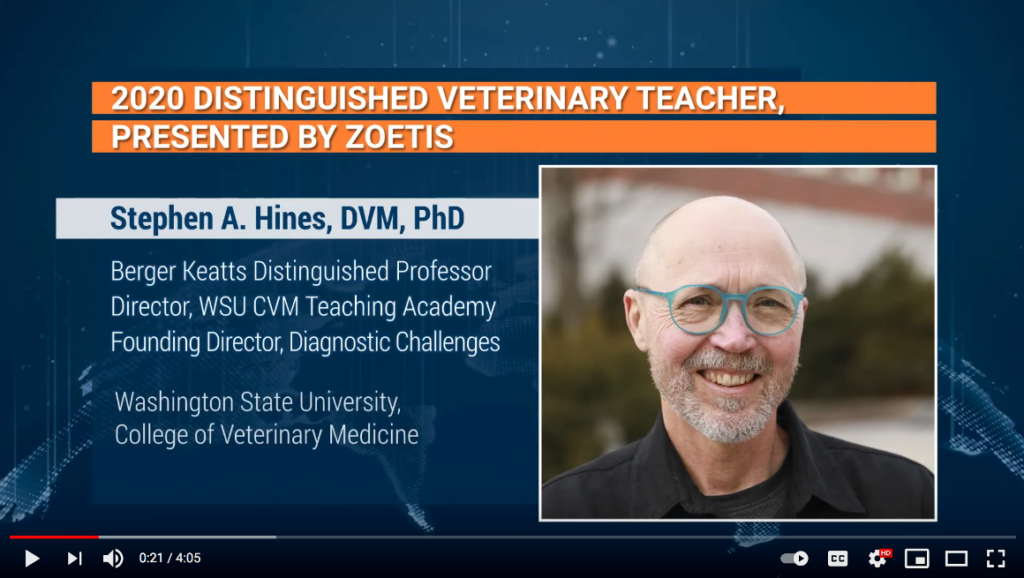
AAVMC award-winners were introduced during the conference via compelling videos that profiled honorees. Videos profiled Distinguished Veterinary Teacher Award recipient Dr. Stephen Hines, Excellence in Research Award recipient Dr. Juergen (Jürgen) A. Richt, Iverson Bell Award recipient Dr. Ruby L. Perry, Billy E. Hooper Award for Distinguished Service Award recipient Dr. Corrie Brown, and Senator John Melcher Leadership in Public Policy Award recipient Dr. Michael J. Blackwell.
Keynoters: Time for Innovation and True Societal Change
Among the keynote speakers, there were some common themes, such as the importance of asking the right questions and how wrestling with the answers can be an uncomfortable, but necessary process.
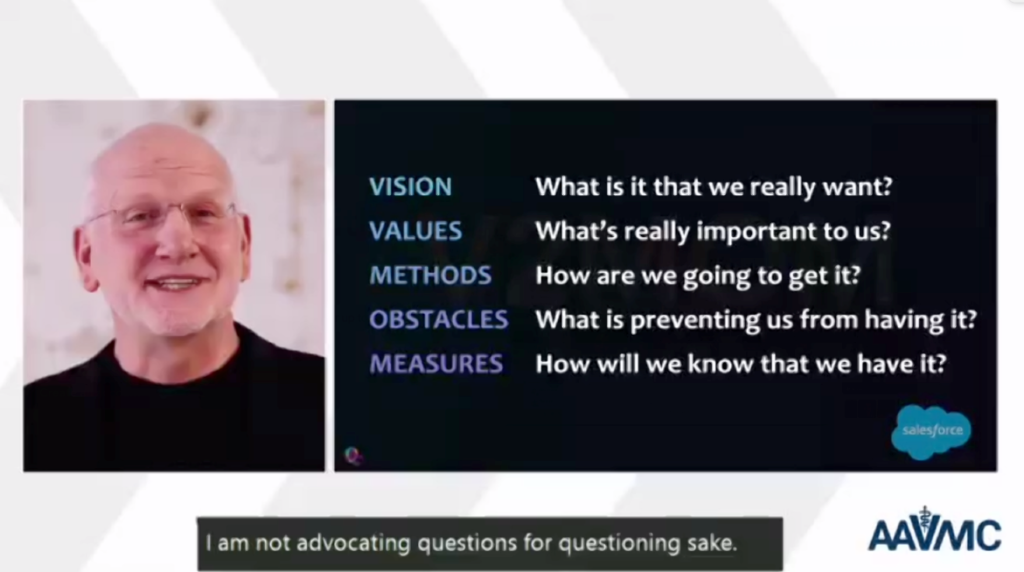
“Questions are the answer,” said Massachusetts Institute of Technology (MIT) leadership expert and keynote Gregersen. “Questions are catalytic … The best leaders without exception ask exceptional questions that others miss.” Gregersen is the author of The Innovator’s DNA: Mastering the Five Skills of Disruptive Innovators. He said that “listening deeply” is the key to asking the right questions and breaking through to create disruptive innovation. He encouraged people to conduct “question audits,” or brainstorming sessions that consist of only questions in order to “foster fearless inquiry.”
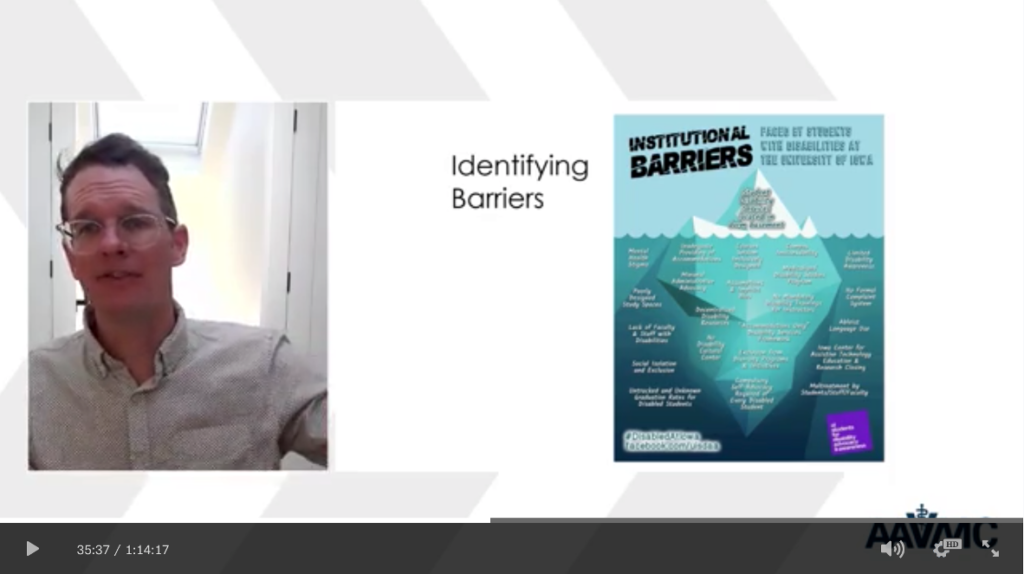
“We all need to care about disability,” said keynote speaker Dr. Jay Dolmage, noting that the plight of disabled individuals is under-recognized and under-resourced. Dolmage, the author of Academic Ableism: Disability and Higher Education, used the architecture of ramps and stairs as metaphors for access vs. obstacles that can exclude or discourage the disabled. He pointed out that providing accommodations for the disabled is a vital part of inclusivity.
“There is no ‘normal’ body or mind,” he said. “We will all become disabled at some point. We need to care about disability now.”
During a post-session Twitter chat, Dolmage commented that, “Everything cool that your smartphone does was originally a special technology for disabled people. Now we all benefit from them being available to all of us.” He also encouraged attendees to learn from disabled people and warned that, “the most dangerous assumption we can ever have about a disabled person is that they cannot do something.”
Access the Twitter chat with Dr. Dolmage here.
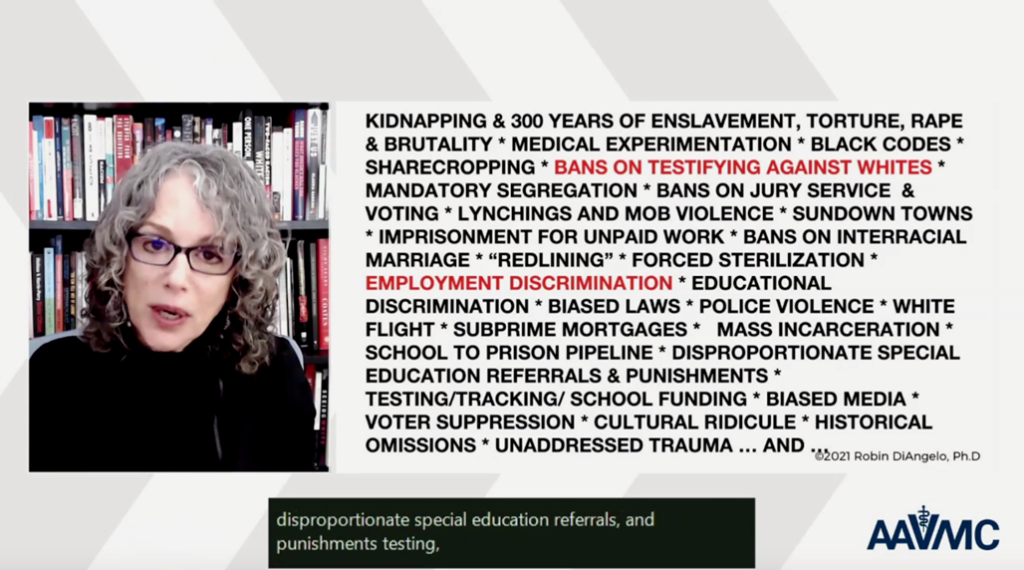
“I’m here to push and challenge white people,” White Fragility author Dr. Robin DiAngelo told the audience. “We’re not going to get where we need to go from a place of white comfort.”
DiAngelo illustrated the pervasiveness of racism in society by asking the white people in the audience some penetrating questions to challenge their assumptions about race… “Did your parents have Black friends?” “How often did you have a teacher of a different race?” “How many Black people were at your wedding?”
She presented multiple statistics to show the overwhelming prevalence of white males in powerful positions and emphasized that not being racist is “not about niceness or meanness,” but extends to more deeply entrenched issues and beliefs that might include measuring the value of something (schools, neighborhoods) by the absence of Black people.
She acknowledged that admitting and dealing with racism is necessarily uncomfortable and emphasized the importance of engaging with issues that revolve around racism and being proactively mindful of racism’s role in everything from hiring and admissions to media portrayals and interpersonal relationships. She said that it’s not up to white people to judge the validity of the Black experience, but to listen, learn and do better.
Conference content, with the exception of Dr. DiAngelo’s presentation, will remain accessible to conference attendees at no additional charge for the next month.
Virtual Advocacy Day Successful Venture as Well
The annual conference wasn’t the only virtual presentation. For the first time ever, the AAVMC’s Advocacy Day was orchestrated online… and it went very well, according to AAVMC Governmental Affairs Director Kevin Cain.
A total of 87 participants from 24 states representing 91 House districts and 53 Senate offices representing 27 states conducted 144 meetings during the event, which was held over two days.
AAVMC volunteers focused on three strategic AAVMC priorities as well as issues unique to their own schools and colleges during the event.
New 2021-22 AAVMC Board Leadership Installed
New leaders have taken their seats on the 2021-22 AAVMC Board of Directors and the board has been expanded to include a new non-voting liaison from the Association of Veterinary Technician Educators (AVTE).
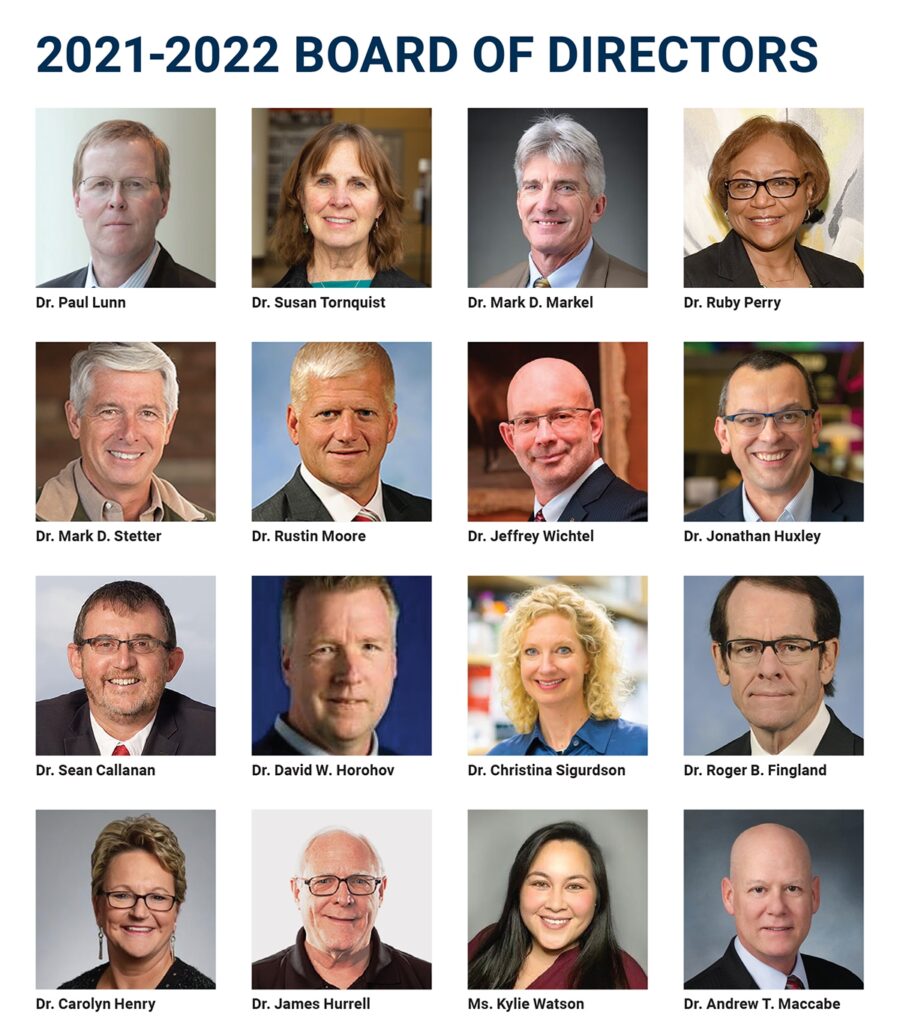
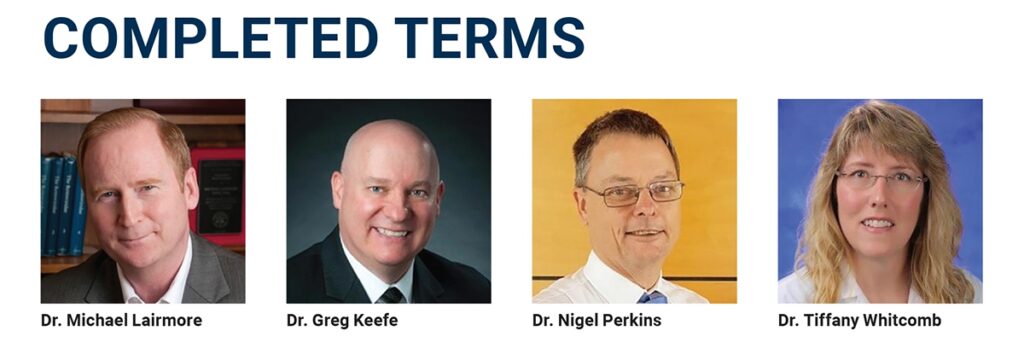
Dr. Paul Lunn, dean of the North Carolina State University College of Veterinary Medicine, has become President and Board Chair. An equine immunologist, Lunn earned his BVSc. from Liverpool University, his MS from the University of Wisconsin-Madison, his PhD from Cambridge University, and is board certified by the American College of Veterinary Internal Medicine (ACVIM). Prior to accepting the deanship at NCSU, he held leadership positions at Colorado State University and the University of Wisconsin.
Lunn, who served for the past year as President-Elect, replaces Dr. Mark Markel, dean of the University of Wisconsin School of Veterinary Medicine and a person who has held leadership positions within the AAVMC for the past five years. Markel will now move to the office of Past-President.
“I’ve known Dr. Markel for many years and we have enjoyed working together for the AAVMC,” said Dr. Lunn. “Mark has driven many of the most important initiatives at the AAVMC over the past decade. For that we are very grateful, and we’re looking forward to his continued contributions to the leadership team during the year ahead.”
Dr. Markel will replace Dr. Michael Lairmore, dean of the University of California-Davis School of Veterinary Medicine as Past-President. Lairmore, who has completed his term as Past-President, recently announced he will conclude his tenure as dean at California-Davis and soon undertake a sabbatical.
“I really credit Michael and our other board members for the success we’ve had over the past several years,” said Markel. “These volunteers give so freely of their time and talents to serve on this board, which is working for the greater good of academic veterinary medicine. I’m very grateful for their contributions, and I’d like to personally recognize and thank my colleagues who are completing their terms of service.”
Dr. Susan Tornquist, the Lois Bates Acheson Dean of the Carlson College of Veterinary Medicine at Oregon State University, was elected President-Elect and becomes a member of the Executive Committee. Tornquist earned her DVM from Colorado State University and her PhD from Washington State University. Dr. Tornquist has served as president of the American Society for Veterinary Clinical Pathology (ASVCP) and the American College of Veterinary Pathology (ACVP).
Other officers on the board will remain the same. Dr. Mark Stetter, Dean of the Colorado State University College of Veterinary Medicine and Biomedical Sciences, will remain as Treasurer and Dr. Ruby Perry, dean of the Tuskegee University College of Veterinary Medicine, will remain Secretary of the Board.
Dr. Greg Keefe, dean of the Atlantic Veterinary College at the University of Prince Edward Island, is succeeded by Dr. Jeffrey Wichtel, dean of the Ontario Veterinary College at the University of Guelf as At-Large Director Region II (Canada).
Dr. Nigel Perkins, Head of the School of Veterinary Medicine at the University of Queensland is succeeded by Dr. Jonathan Huxley, Head of the Massey University School of Veterinary Science as At-Large Director Region III (Australia, New Zealand and Asia).
Dr. Tiffany Whitcomb, Department of Comparative Medicine at the Pennsylvania State University, is succeeded by Dr. Christina Sigurdson, co-director of the Center for Veterinary Sciences and Comparative Medicine at the University of California-Davis, as At-Large Director Representing Departments of Comparative Medicine.
The AAVMC Board of Directors recently created a 16th seat on the Board to represent the Association of Veterinary Technician Educators as a result of growing mutual interests in academic veterinary medicine. Dr. James Hurrell of Penn Foster University will now serve as At-large Director Representing the AVTE (non-voting).
The AAVMC Assembly elects board members, meeting in conjunction with the Deans Leadership Conference, usually held in January. Terms of service, however, still begin and end with the final day of the annual conference.
AAVMC Study Examines Bias in Admissions Processes, Standards
A new AAVMC study finds that admission offers from veterinary medical schools tend to be lower or higher for certain groups, indicating that unintended bias still exists despite recent efforts to be more inclusive and adopt more holistic admissions practices.
The study recommends that schools focus more attention on overcoming barriers to admission based on factors such as race/ethnicity, gender, culture or socioeconomic status.
The AAVMC’s DiVersity Matters program has worked to draw attention to the need for veterinary medicine to be more inclusive and advocates for the recruitment and retention of underrepresented persons as students and faculty. Many schools have reexamined their admissions practices and adopted a more “holistic” approach that considers factors beyond academics–such as life experience, communication skills, or other personal skills that might contribute to success. However, this data analysis shows that some groups are still disadvantaged.
Consultant Dr. James W. Lloyd, a former veterinary medical school dean, and the AAVMC’s Senior Director of Institutional Research and Diversity Dr. Lisa M. Greenhill, conducted the study, which compiled and analyzed data from the Veterinary Medical College Application Service 2018-2019 cycle post-application survey and the 2019 post-admissions student survey.
The study found that admission offers were lower for candidates from underrepresented racial or ethnic groups, Pell Grant recipients, first-generation college students, candidates from rural communities and candidates who aspired to practice in rural communities. Offers tended to be higher for candidates who were white, male, grew up in suburban communities, were not Pell Grant recipients and whose parents attended college.
The study’s authors wrote that, “…these findings signal a very real need to reexamine admission processes. Schools and colleges of veterinary medicine should objectively and rigorously review their admissions processes and reevaluate those elements, such as the number of veterinary, animal, or total experience hours, that may be a source of inherent bias against particular groups of applicants.”
For example, candidates overwhelmingly reported that their veterinary experience contributed to their understanding of the veterinary medical profession. However, candidates who identified as under-represented or female, along with those who were Pell Grant recipients, reported greater difficulty in obtaining veterinary experience.
“Admittedly, the barriers/deterrents are not absolute—many disadvantaged candidates are ultimately successful in gaining an offer of admission,” wrote the authors, “but the playing field is certainly not level for all candidates; candidates from disadvantaged groups must overcome disproportionate degrees of difficulty to achieve their goals.”
AAVMC Names New Editor-in-Chief of Journal of Veterinary Medical Education (JVME)
A respected educator from the North Carolina State University College of Veterinary Medicine (NCSU-CVM) with almost 20 years of experience working with the Journal of Veterinary Medical Education (JVME) has been named Editor-in-Chief (EIC). Dr. Regina Schoenfeld-Tacher, associate professor of veterinary educational development in the NCSU-CVM’s Department of Molecular Biomedical Sciences, will succeed Dr. Daryl Buss, who has served as EIC since 2012, effective July 1, 2021.
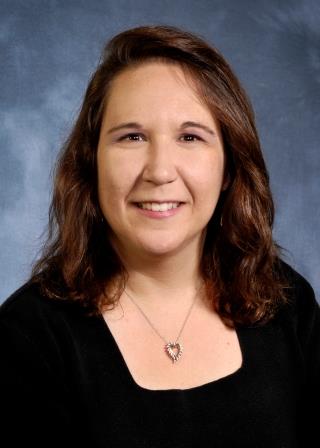
“We’re fortunate to recruit a leader with such extraordinary experience and capabilities, and look forward to the contributions Dr. Schoenfeld-Tacher will make as Editor-in-Chief,” said AAVMC CEO Dr. Andrew T. Maccabe. “I would also like to congratulate and thank Dr. Buss for his achievements in taking the JVME to the levels of quality and influence it has earned during his tenure. These educators have been collaborating for many years, and I’m sure that bodes well for the future success of the JVME.”
Schoenfeld-Tacher assumes leadership of the respected academic journal during a pivotal time in the history of academic veterinary medicine and the profession it supports. The global pandemic and zoonotic disease threats, reams of scientific evidence about the crucial importance of the human-animal bond and food production and security issues are all focusing attention on the importance of veterinary medicine and the educational programs that undergird the profession.
Schoenfeld-Tacher is eminently qualified to undertake the task. Her almost two-decade span of engagement with the JVME includes working with the JVME’s past three EIC’s, including a leadership role and close working relationship with EIC Buss, whom she credits as a mentor.
“My appointment as Editor In Chief for JVME is tangible evidence of AAVMC’s commitment to educational innovation and diversity/inclusion,” said Schoenfeld-Tacher. “I am the first veterinary educationalist to serve in this role, as well as the first female and Latina EIC in the history of the Journal. I am honored to work with the Editorial Board to continue building upon their and Dr. Buss’ efforts to elevate JVME to its current status as a leading peer-reviewed publication focusing on the scholarship of teaching and learning in veterinary medicine.”
Schoenfeld-Tacher has served as a member of the JVME Editorial Board since 2007, and as a Guest Editor and Handling Editor since 2012. She proposed and led efforts to produce theme editions on “Educational Theory and Practice” and on “Curricular Management and Renewal.” She has also played an important role in refining internal processes related to manuscript review and acceptance as well as key-word searchability.
Over the past 21 years, she has authored or co-authored 82 refereed journal articles, including 28 which were published in the JVME. Those included two manuscripts which explored the 50-year history of the AAVMC as well as a retrospective content analysis of articles published in the JVME, each of those deepening her understanding of the role, breadth and scope of the journal.
In addition to her work with the JVME, she has served on the editorial board of the International Journal of Problem Based Learning and as a peer reviewer on nine additional academic journals.
Schoenfeld-Tacher will steward the journal’s evolving responsibility as the premiere refereed journal serving the global academic veterinary medicine and is excited about future opportunities for growth and impact. She is interested in elevating the role the JVME can play in fostering diversity, equity and inclusion throughout the worldwide academic veterinary medical community, and particularly interested in reaching out to veterinary educators in Latin America.
Schoenfeld-Tacher earned a PhD in chemical education and a MA degree in educational technology from the University of Northern Colorado, and an EdM in science education as well as two undergraduate degrees from Boston University.
Schoenfeld-Tacher has extensive experience in educational development and instructional design. In 2012, she organized the Veterinary Educator Collaborative, which evolved into an AAVMC component organization.
Prior to her 2013 appointment on the NCSU faculty, she served for 14 years on the faculty of the Colorado State University College of Veterinary Medicine and Biomedical Sciences.
Published bi-monthly by the AAVMC and the University of Toronto Press, the JVME provides a forum for the exchange of ideas, research, and discoveries about veterinary medical education.
The journal’s areas of focus include best practices and educational methods in veterinary education; recruitment, training, and mentoring of students at all levels of education, including undergraduate, graduate, veterinary technology, and continuing education; clinical instruction and assessment; institutional policy; and other challenges and issues faced by veterinary educators domestically and internationally.
AAVMC Introduces Video Series on Strategic Plan
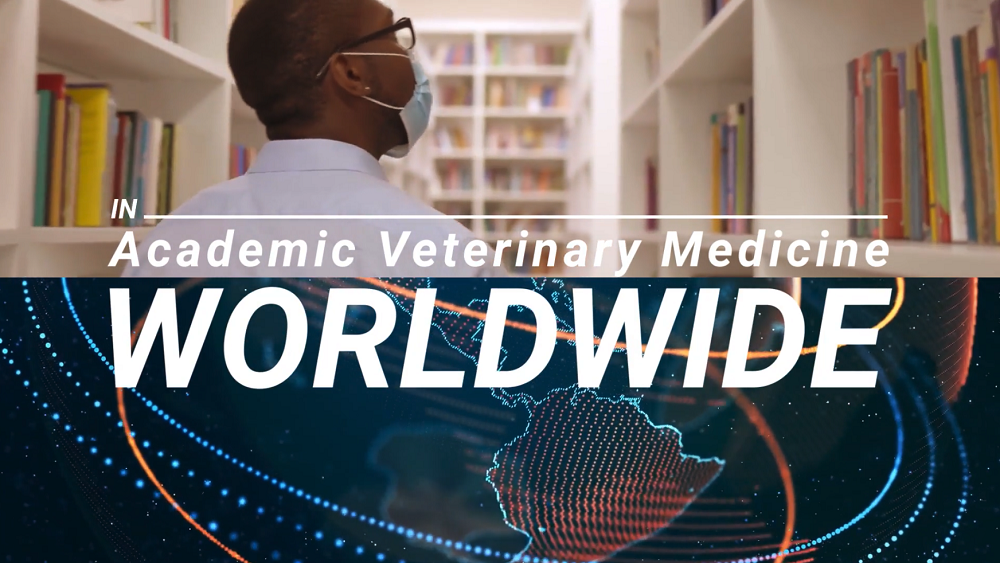
The AAVMC introduced a series of six new videos highlighting the AAVMC and its new strategic plan, as well as programmatic initiatives within the five major areas of the plan during the annual conference.
The rapid-paced vignettes run about :80 and are designed to tell a story about programs within a strategic area as opposed to simply describing specific goals and strategies.
For example, video 5 discusses both the ways that the AAVMC supports the success of member institution research programs as well as the substantial institutional research programs the AAVMC conducts.
The first of the series, which outlines the vision, mission, and values of the AAVMC is a general overview of the AAVMC called “Pursuing Excellence in Academic Veterinary Medicine.” The next five in the series correlate more specifically to the five major goals of the new strategic plan.
Video #1, entitled The AAVMC: Powering Ideas, Creating Opportunities and Building Support, focuses on Goal #1: “Serve as the thought leader and primary advocate for academic veterinary medicine.”
Video # 2, The AAVMC: Recruiting and Developing Future Generations of Veterinarians, focuses on Goal #2: “Identify, Inspire, and recruit qualified and diverse applicants who will serve as the future veterinary medical workforce.”
Video #3, The AAVMC: Leading in Professional Development, focuses on Goal #3: “Build a robust pipeline of future scholars and academic leaders for academic veterinary medicine and support them throughout their careers.”
Video #4, The AAVMC: Creating Excellence in Veterinary Medical Education, is focused on Goal #4: “Advance Teaching and learning to prepare students faculty and academic staff for professional success in a wide variety of careers.”
Video #5: The AAVMC: Leading in the Production of Knowledge, is focused on Goal #5: “Foster discovery to improve the health and wellbeing of people, animals and the environment.”
All of the videos are available on the AAVMC’s YouTube channel.
Journal of Veterinary Medical Education Hybrid Model Created to Enhance Access
The AAVMC and the University of Toronto Press are pleased to announce that beginning in July 2021, the Journal of Veterinary Medical Education (JVME) will adopt a hybrid print and online publishing model which will incorporate open access of all published content.
The move is being undertaken to expand access to important developments in veterinary medical education. JVME’s transition to a hybrid publishing model will amplify its global reach to veterinary medical practitioners, educators, researchers, prospective and current veterinary medical students and other stakeholders.
Under the new operating model, all content published in JVME will be published with a 12-month open access embargo. Based upon the date of issue publication, and at no cost to authors, all articles will become open access directly on the journal’s website 12 months after publication. During the first 12 months of publication, content will remain available to members of the AAVMC and by subscription to both library and individual customers.
As an additional option, authors may choose, with payment of a fee, to publish individual manuscripts using the gold open access model, whereby the manuscripts will be published open access immediately after acceptance, without an embargo. The journal’s Advance Online feature will be maintained under the new model.
Shifting the JVME to a hybrid model will foster AAVMC goals of building public awareness of the ways veterinary medicine is advancing global health and wellbeing; promoting careers in veterinary and biomedical research among students, applicants and pre-applicants; and supporting engagement, sharing and collaboration among AAVMC member institution research administrators.
Increased visibility and more timely access to the research presented in JVME will also promote interprofessional collaboration and improve outreach to the media and policy-makers, further increasing the impact of JVME and its authors on international veterinary medicine.
While addressing the rapidly changing world of veterinary medicine, JVME remains strongly committed to ensuring that the highest ethical standards are honored in all areas of published research. Rigorous peer-review processes will maintain the high-quality trusted research for which JVME is known and respected.
This move is the latest effort in the JVME’s quest to continuously improve its service to the academic veterinary medical community. In 2020, JVME increased the annual number of issues published from four to six in response to the steady increase of high-quality scholarly manuscripts and the need for rapid access to crucial research within the veterinary medical education field.
Published bi-monthly by the AAVMC and the University of Toronto Press, the JVME provides a forum for the exchange of ideas, research, and discoveries about veterinary medical education. This exchange benefits veterinary faculty, students, and the veterinary profession as a whole by preparing veterinarians to better perform their professional activities as they help the profession address societal needs.
The journal’s areas of focus include best practices and educational methods in veterinary education; recruitment, training, and mentoring of students at all levels of education, including undergraduate, graduate, veterinary technology, and continuing education; clinical instruction and assessment; institutional policy; and other challenges and issues faced by veterinary educators domestically and internationally.
For additional information, contact JVME Editor-in-Chief Dr. Daryl Buss at dbuss@aavmc.org or University of Toronto Press Journals Vice President Antonia Pop at apop@utpress.utoronto.ca.
CIVME and World Veterinary Association Collaborate on Global Education Project
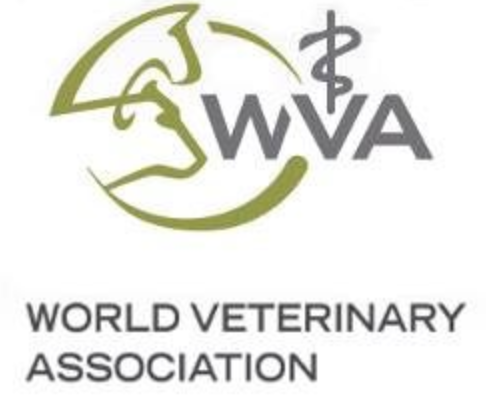
A new partnership between AAVMC’s Council on International Veterinary Medical Education (CIVME) and the World Veterinary Association (WVA) has been established.
“The WVA is excited to partner with AAVMC’s CIVME to launch a project on Global Quality Standards for Veterinary Education to improve the quality of veterinary education around the world and to develop a self-assessment mechanism for veterinary colleges in regions or countries without formal accreditation systems,” said Dr. Patricia Turner, President of the WVA.
The new project emerged from the two organizations’ mutual interest in promoting, supporting, and advancing international veterinary education.
“This is a big step forward for what has always been a very promising initiative,” said AAVMC CEO Dr. Andrew T. Maccabe. “We founded CIVME in 2016 with the goal of increasing the quality of academic veterinary medicine around the world. The WVA shares these goals, and we are pleased to see this natural partnership emerge. We’re looking forward to making progress in a very important area.”
The project includes a survey and the development of a self-assessment tool. It will produce a report on findings at the conclusion of the project and is currently slated to run for two years, with the option to extend as needed. For more information, please contact civme@aavmc.org
CIVME Announces 2021 Series of Program Grants
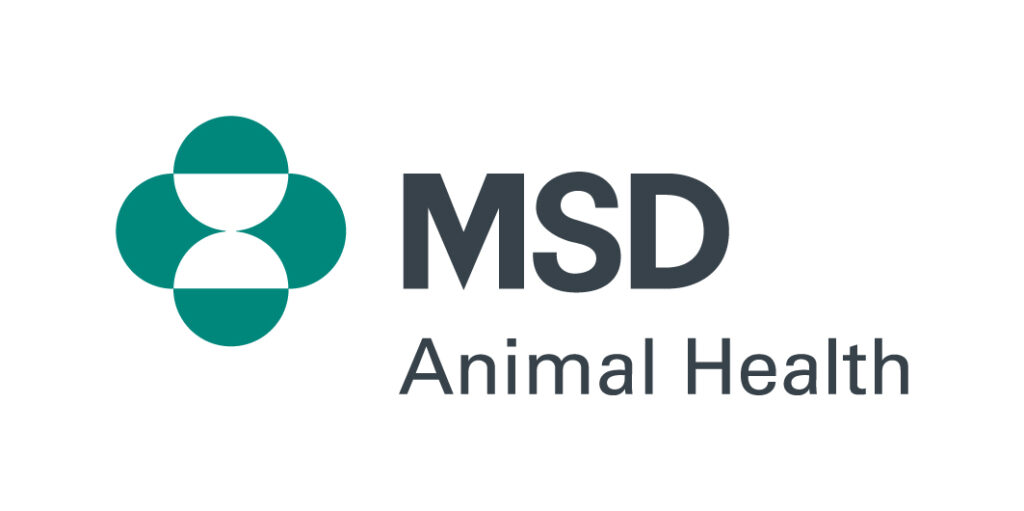
The AAVMC’s Council on International Veterinary Medical Education (CIVME) has funded three program grants designed to foster the enrichment and advancement of international academic veterinary medicine and two Antimicrobial Stewardship Grants, sponsored by MSD Animal Health.
- “Global Grand Rounds in Diagnostic Imaging Educational Exchange” – Masahiro Murakami, Purdue University College of Veterinary Medicine.
- “‘Eeeesing’ the Stress: Educators’ Experiences of Epistemic Emotions”- Elizabeth Armitage-Chan, Royal Veterinary College.
- “Identifying and Sharing Innovations in Clinical Skills Teaching Developed Globally in Response to COVID-19” – Rebecca Parkes, City University of Hong Kong.
As a result of the success of last year’s inaugural presentation of the MSD Animal Health CIVME Antimicrobial Stewardship Grant, the program was expanded to include two grants this year. These are designed to improve instructional programs related to antimicrobial resistance in educational institutions around the world.
2021 recipients of the CIVME Antimicrobial Stewardship Grant, sponsored by MSD Animal Health include:
- “Promoting Antimicrobial Stewardship Programs in Global Veterinary Medical Academic Settings Through the Understanding of Attitudes and Perceived Barriers to Implementation” – Emily Feyes, The Ohio State University College of Veterinary Medicine.
- “Seminar on the Prudent Use of Antibiotics in Aquaculture” – Sophie St-Hilaire, City University of Hong Kong.
CIVME was founded in 2016 to help advance AAVMC interests in elevating the quality of international academic veterinary medicine. Specifically, the charge from the AAVMC Board of Directors was to “advance high-quality veterinary education internationally through enabling and empowering best practice.” CIVME seeks to advance their initiatives by promoting inter-regional collaboration.
CIVME comprises representatives from eight major global regions (Australasia, North America, Central/South America, Continental Europe, UK/Ireland, Middle East, Africa and Asia).
AAVMC, AVMA Release Joint Statement on Suicide Prevention, Webinar Scheduled

The AAVMC and the AVMA have released a Joint Statement from AAVMC/AVMA Regarding Mental Health and Suicide in the Veterinary Profession urging members of the profession to be aware of the importance of mental health and wellbeing and the resources that are available to help. In November 2019, a toolkit for colleges of veterinary medicine was created by the American Foundation for Suicide Prevention (AFSP) in partnership with the AVMA and the AAVMC. The AVMA’s Dr. Jen Brandt, Director of Wellbeing, Diversity and Inclusion Initiatives, and the AAVMC’s Ms. Makenzie Peterson, Director for Wellbeing, will be hosting a webinar for the veterinary community on a systems-based approach to supporting mental health and suicide on Thursday, March 18th, from 1 p.m. – 3 p.m. EST. This webinar will provide information, education, and support, with resources developed in collaboration with the American Foundation for Suicide Prevention. Webinar registration information will be available soon.
Johnson (R-SD) Teams with Schrader (D-Oregon) to Lead Veterinary Medicine Caucus
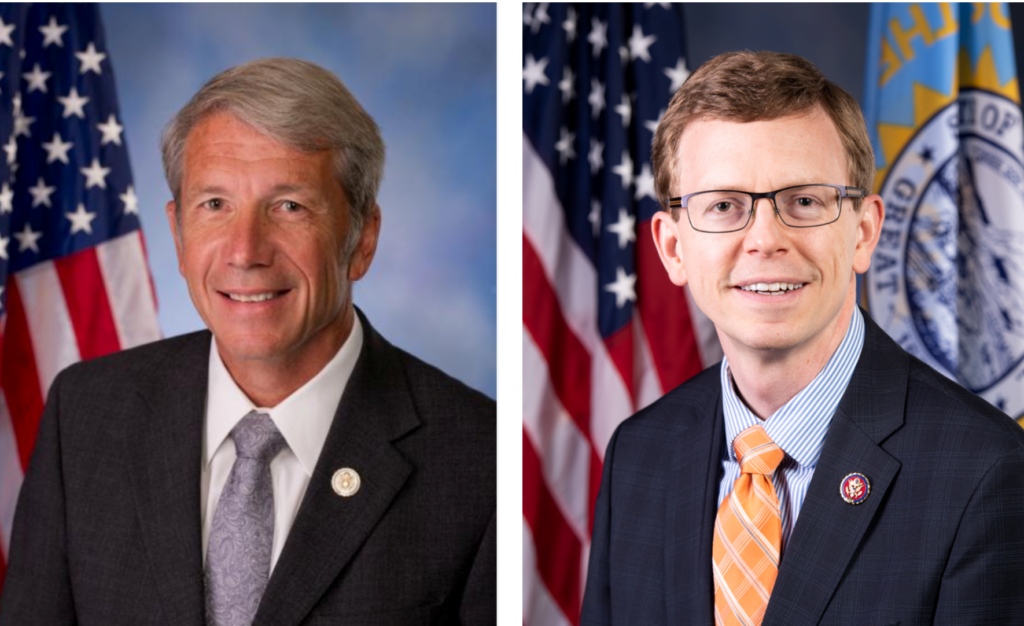
Representative Dusty Johnson (R-SD) has agreed to co-chair the Veterinary Medicine Caucus in the U.S. House of Representatives. The AAVMC has worked closely with the American Veterinary Medical Association to support the caucus since its inception in 2013.
Representing South Dakota, this is Johnson’s second term in Congress. He currently serves on the Committee on Agriculture and the Committee on Transportation and Infrastructure.
“Science-based animal health keeps South Dakota livestock and companion animals happy and healthy,” said Rep. Johnson in a news release issued by the AVMA. “I’m proud to serve as co-chair of the Veterinary Medicine Caucus and will continue to advocate for science-driven policy, strong research and development in this growing industry.”
Johnson will work with Congressman Dr. Kurt Schrader (D-Oregon), who has helped lead the caucus since its inception and is the only veterinarian serving in Congress.
Johnson replaces Congressman and veterinarian Dr. Ted Yoho (R-Florida), who chose not to run for reelection to the 117th Congress.
“We’re looking forward to working closely with the American Veterinary Medical Association and the Veterinary Medicine Caucus during the 117th Congress,” said American Association of Veterinary Medical Colleges (AAVMC) Chief Executive Officer Dr. Andrew T. Maccabe. “The COVID pandemic is just one example of why we need to make sure federal government policies help support and sustain the veterinary medical profession. We’re honored to welcome Congressman Dusty Johnson as the new caucus co-chair, and we’re looking forward to working with him and Congressman Kurt Schrader during this critical period in our nation’s history.”
The Veterinary Medicine Caucus has played a lead role in legislation that impacts veterinary medicine such as the VET MED Act, the Veterinary Medicine Loan Repayment Program Enhancement Act, and the One Health Act. It has also worked to secure funding for important veterinary-related federal programs.
Nomination Period Open for 2021 AAVMC Communications, Fundraising Awards
Nominations are now being accepted for two AAVMC Awards which recognize excellence in institutional advancement among AAVMC members. The window for submitting nominations runs from February 1, 2021 – March 31, 2021 and the awards consider organizational performance during calendar year 2020.
The AAVMC’s Communications Excellence Award recognizes the important role communication plays in advancing academic veterinary medicine. The AAVMC’s Excellence in Scholarship Fundraising Award is designed to inspire and recognize professional excellence and achievement in fundraising for DVM student scholarships.
Please click the links for more detailed information about the program.
NIAMRRE Presents Annual AMR Conference April 20-21, 2021

The National Institute of Antimicrobial Resistance Research and Education (NIAMRRE) Annual Conference is April 20-21, 2021.
The conference will be held in four, two-hour blocks over the course of two days, with a dedicated virtual poster session during the lunch break each day.
Antimicrobial Resistance (AMR) is one of the greatest threats to society, human and animal health, and economic prosperity and AMR happens when bacteria develop the ability to defeat the drugs designed to kill them.
The #EngageAMR21 virtual conference includes a variety of traditional presentations, interactive talks, and facilitated discussions. The student poster contest is online and will award cash prizes to the top three submissions.
The NIAMRRE Annual Conference is open to both NIAMRRE members and non-members. Member institutions may send unlimited representatives. Non-member tickets are $50 total for both days. If you are not a current NIAMRRE scientist, consider becoming one by emailing info@niamrre.org for a Scientist or Student Scientist Application.
NIAMRRE was established following a multiyear collaboration between the AAVMC and the Association of Public and Land-grant Universities.
For more information about the NIAMRRE Annual Conference, contact Erica Hellmich at ericah@iastate.edu or 515.294.3352
In the News
Nearly Paralyzed French Bulldog Walking Again Thanks to New Surgery and a Little Bit of Luck
People
Profession’s First-hired Diversity Advocate Reflects on Journey
VIN
UC Davis Researchers Explain COVID-19 Variants, How Vaccines Would Respond
FOX 40
Florida Vet Team Removes Sneaker from 341-pound Crocodile’s Stomach
FOX News
Developing a Targeted Delivery System to Treat Cancer
Technology
AAVMC Names Billy E. Hooper Award Winner
dvm360
Longtime Canine Epilepsy Treatment Gains Conditional Approval
News
Column: Are You Giving Your Pets Supplements to Ward Off COVID? Don’t Bother
Los Angeles Times
New Journal of Veterinary Medical Education Hybrid Model to Enhance Access
EquiManagement
Finding Better Ways to Detect and Measure Infectious Viruses in the Air
Technology
New Scholarship to Promote DEI Efforts in Veterinary Medicine
dvm360
USask Awarded $6.76M to Help Revive North American Bison Population
Yorkton This Week
Black History Month: Four Influential Figures You Should Know
dvm360
Why Having a Pet is Good for Your Health
Columbus Monthly
Dr. Katherine Houpt on Biden Dog’s Misbehavior
Voice of America
From Our Members
CSU Vaccine Research Advances, Groundwork Begins to Develop Coronavirus Vaccine for the Next Pandemic
Colorado State University
An ‘Electronic Nose’ to Sniff Out COVID-19
University of Pennsylvania
From Animals to People and Back Again
University of Pennsylvania
WSU Begins Study Examining Human Cancer Treatment in Dogs
Washington State University
Study: ‘Stealthy’ Stem Cells Better for Treating Tendon Injuries in Horses
North Carolina State
Saving the Sea Turtles
Tufts University
Multi-Model Approach Could Help Farmers Prepare for, Contain PEDV Outbreaks
North Carolina State University
PetSmart Charities Gives More than $300,000 in Grants for Midwestern University Veterinary Programs
Midwestern University
People in Motion
Prof Ho-Jae Han has been named as the dean at Seoul National University.
“Like” us on Facebook or follow us on Twitter, LinkedIn, and Instagram:




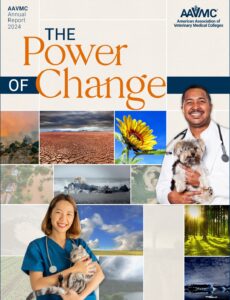
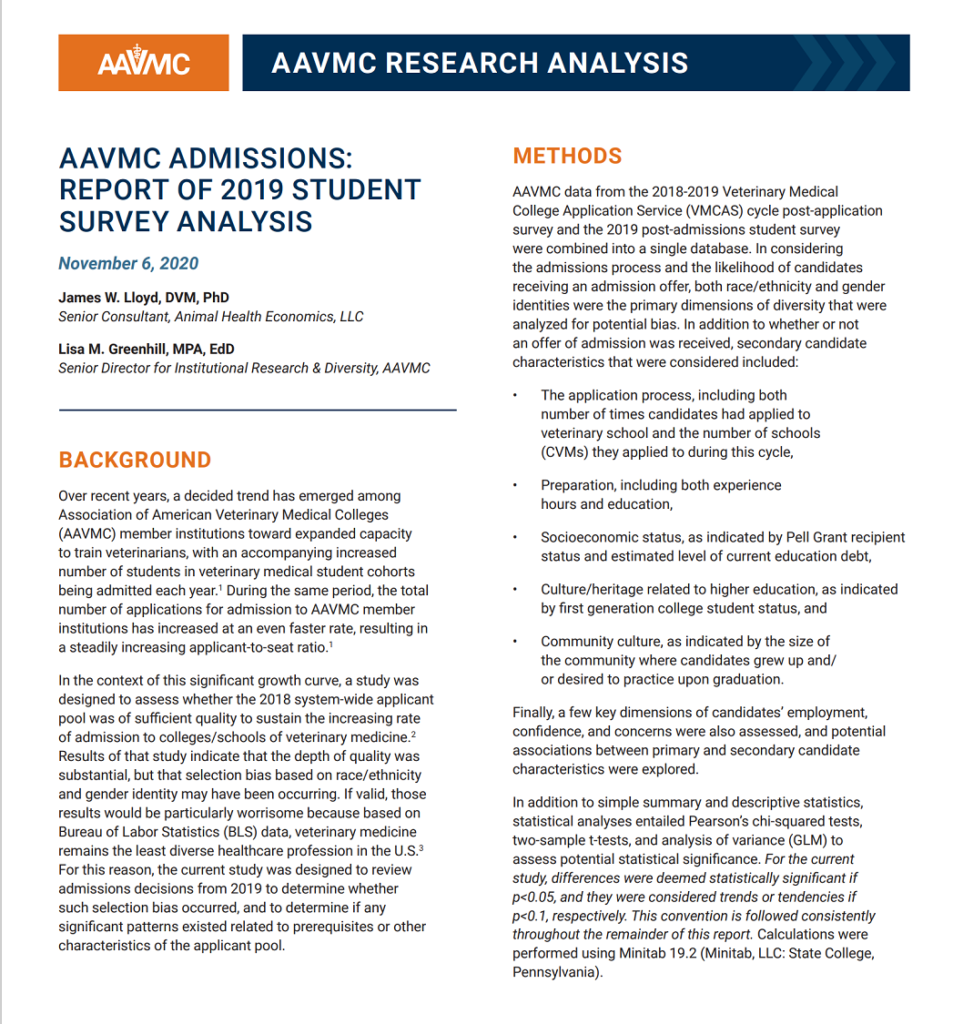
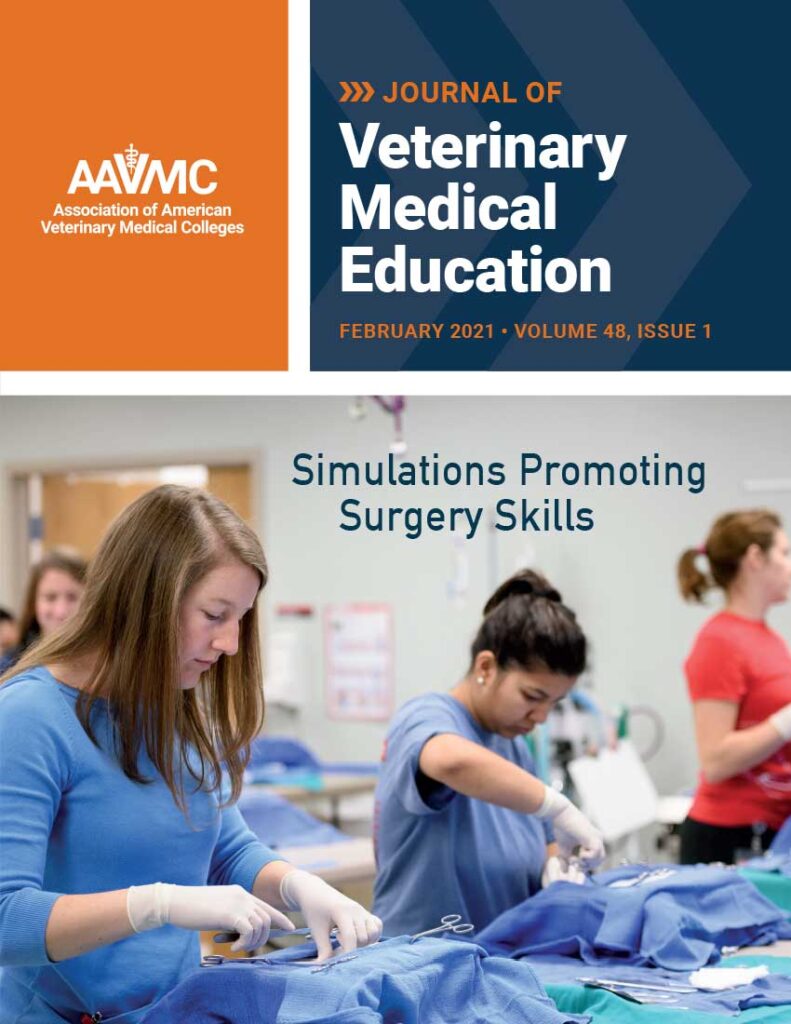




SHARE